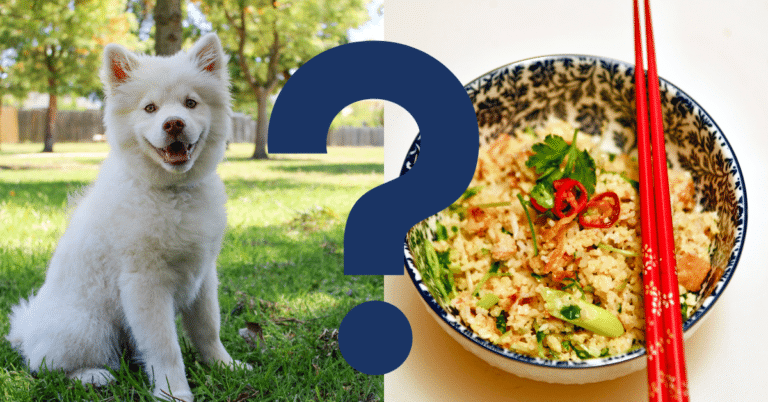Can Dogs Eat Egg Yolk? A Vet’s Opinion

Egg yolks are the yellow part at the center of an egg. They contain high cholesterol levels but also provide a range of vital nutrients. But can you feed egg yolk to your dog?
Yes, dogs can eat egg yolks. Egg yolks are an excellent source of protein, good fats, and vitamins and minerals like A, D, and iron. However, providing egg yolks to dogs in moderation is essential because too much can induce a nutritional imbalance. Consult a veterinarian to determine the appropriate amount of egg yolk to add to your dog’s diet based on their specific needs.
Benefits Of Egg Yolk For Dogs
When egg yolks are included in a dog’s diet, they can prove beneficial in several ways:
Protein
Egg yolks are a high-quality protein source. Protein is essential in dogs for developing tissues, healing, and maintenance. It helps with muscle development and the maintenance of several biological functions.
Omega-3 Fatty Acids
Egg yolks contain healthy lipids, including omega-3 and omega-6 fatty acids. These fats improve skin health and absorb fat-soluble vitamins
, thus improving a dog’s overall health.
Minerals And Vitamins
Vitamins A, D, E, K, and B vitamins (especially B12 and folate), iron, selenium, and phosphorus are abundant in egg yolks. These nutrients benefit dogs’ overall health by promoting immune system function, bone health, eyesight, and energy production.
Choline
Choline, a nutrient needed for brain function, transmission of signals, and metabolism, is abundant in egg yolks. Choline improves cognitive function and can help dogs with memory and learning.
Biotin
Biotin is a B vitamin found in egg yolks that promotes healthy skin and coat. Because of its benefits in keeping a bright and lustrous coat, biotin is frequently included in commercial dog meals and supplements.
Digestibility
Dogs easily digest egg yolks, giving them a pleasant and healthy addition to their diet. They can also aid dogs with digestive disorders because they are well-tolerated and can increase nutrient absorption.
Appetite Stimulation
Some dogs’ appetites may be suppressed, or be fussy eaters. Adding a modest amount of egg yolk to their diet might tempt them to eat while adding flavor.
Despite the numerous advantages, moderation is vital while feeding egg yolks to dogs. An excess of egg yolk in their diet may produce an imbalance, as they still need a balanced meal with other essential nutrients from sources such as meat, vegetables, and grains. Always consult a veterinarian to determine the optimal amount of egg yolk to be added to your dog’s diet based on their needs.

How To Safely Give Egg Yolk To Dogs
It is critical to give egg yolks to dogs in moderation and carefully. To ensure a safe and valuable addition to your dog’s diet, follow these guidelines:
Introduce Gradually
Begin with a small amount and gradually add egg yolk to your dog’s food. Start with a modest amount, such as half a teaspoon or less, and watch your dog’s reaction. If no harmful effects occur, progressively raise the amount over time.
Select Fresh, High-Quality Eggs
Choose fresh eggs from a reputable source. Organic or free-range eggs are preferable since they are often free of hormones and antibiotics. Expired or cracked eggs should be avoided since they may contain bacteria.
Cook The Egg Yolk
Raw eggs may be contaminated with salmonella or other pathogens. Cooking the egg yolk before feeding it to your dog is generally suggested. Hard-boiling or poaching the egg yolks until fully cooked aids in the elimination of any potential germs.
Separate The Yolk From The White
It is advisable to separate the yolk from the egg white when feeding eggs to dogs. While the yolk is healthy, the egg white includes avidin, which might inhibit biotin absorption. Dogs should not be given raw egg whites.
Avoid Flavors And Additives
Serve the egg yolk without seasonings, salt, butter, or oil. Additional components may be toxic to dogs, causing stomach upset or severe responses.
Serve As A Supplement Rather Than A meal Replacement
Egg yolks should be included in your dog’s regular balanced meal as a supplement. They should not be used in place of the essential components of a well-balanced meal, which include meat, vegetables, and grains. Consult a veterinarian to ensure your dog’s nutritional requirements are satisfied.
Keep An Eye On Your Dog’s Reaction
After adding egg yolks to your dog’s food, observe their behavior for any changes, digestion, or overall health. Stop feeding egg yolks and contact your veterinarian if you detect any adverse reactions, such as vomiting, diarrhea, or allergy symptoms.
Remember that each dog may have different dietary needs or health issues. Before making any significant changes to your pet, always contact a veterinarian.
Will Egg Yolk Make A Dog Sick?
While egg yolks are typically safe for dogs, there is a risk of health problems if fed in excess or if the dog has specific allergies. The following are some potential illnesses or issues associated with eating egg yolks to dogs:
Salmonella or bacterial contamination: Salmonella bacteria can be found in raw or undercooked eggs, causing digestive distress, diarrhea, vomiting, and, in severe cases, food poisoning. To reduce this possibility, it is advised that the egg yolk be adequately cooked.
Allergic reactions: Dogs, like humans, can develop allergies or sensitivities to specific foods, including eggs. Skin irritations, itching, hives, swelling, and gastrointestinal distress are all symptoms of allergic responses. If your dog develops an allergic response after eating egg yolks, stop feeding them and consult a veterinarian.
Pancreatitis: Dogs with a history of pancreatitis or those predisposed to it may be sensitive to high-fat meals, such as egg yolks. Pancreatitis is a pancreas inflammation that a large intake of fatty meals can cause. Symptoms include abdominal pain, vomiting, diarrhea, and tiredness.
Biotin deficiency: Although egg yolks are a significant source of biotin, excessive ingestion of raw egg whites might result in biotin insufficiency in dogs. Avidin, a protein found in raw egg whites, can limit biotin absorption. Separate the yolk from the white and feed the yolk to avoid this problem.
Digestive upset: Some dogs may have sensitive stomachs or gastrointestinal disorders that new diets can aggravate. Egg yolks might induce digestive discomforts such as diarrhea, vomiting, or gas when introduced too rapidly or in large quantities.
It’s important to remember that these potential illnesses are uncommon, and most dogs can tolerate egg yolks without issue. However, watching your dog’s reaction, introducing them gradually, and consulting with a veterinarian will help ensure your dog’s safety and well-being.
Can dogs eat egg yolk variations?
Dogs can eat a variety of egg yolk preparations, but it is crucial to evaluate how they are prepared and any other ingredients. Here are some common egg yolk variances and aspects to consider:
Cooked egg yolk: Cooked egg yolks, frequently prepared by hard-boiling or poaching, are safe for dogs to consume. Cooked egg yolks are easy to digest and give the same nutritional advantages to dogs as raw egg yolks while reducing the risk of bacterial infection.
Scrambled egg yolks can be fed to dogs if they are cooked without potentially toxic ingredients such as onions, garlic, salt, or spices. Scrambled egg yolks made without adding butter or oil are better.
Baked egg yolk: Another option is to bake egg yolks by separating the yolks from the whites and placing them on a baking pan. Baking the egg yolks until they firm produces a different texture and can be a delightful dog treat. Avoid using potentially dangerous cooking sprays or seasonings.
Dehydrated egg yolks can be purchased commercially or manufactured with a food dehydrator at home. Dehydrated egg yolks have a long shelf life and can be used as training or in homemade dog treats. Ensure that the dried egg yolks include no additions or preservatives.
Remember to serve these versions sparingly and avoid adding any substances that could be toxic to dogs. Remember your dog’s nutritional demands, allergies, or sensitivities when introducing different egg yolk varieties. If in doubt, get the advice of a veterinarian to check that the precise egg yolk variety is appropriate for your dog’s diet.

Vet’s Summary
Summary: Egg yolks are a good source of protein, healthy fats, vitamins, minerals, and other nutrients for dogs. When feeding egg yolks to dogs, use caution and ensure they are thoroughly cooked to reduce the possibility of bacterial contamination. While most dogs accept egg yolks well, salmonella infection, allergic responses, pancreatitis in sensitive canines, and biotin deficiency from excessive raw egg white ingestion are all potential health issues. It is critical to monitor the dog’s reaction and consult with a veterinarian to confirm the safety and compatibility of egg yolks for particular pets.
Recommendation: Besides integrating egg yolks into a dog’s diet, owners should consider giving their canine probiotic supplements. Probiotics can help support a healthy digestive tract by encouraging good gut bacteria growth. They can help with digestion, immune system strength, and digestive disorders, including diarrhea or constipation. Probiotics are especially beneficial when a dog has gastrointestinal problems or changes in diet. However, it is critical to check with a veterinarian to select the best probiotic supplement and dosage for your dog, as different strains and formulations may have varied effects.
Videos To Watch
If you are wondering what related foods are good to give your dog, watch this:
And if you want to know what a dog can NOT eat, watch this:






